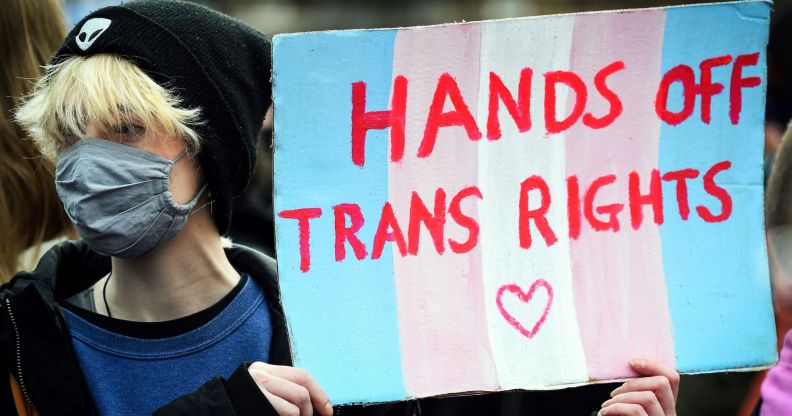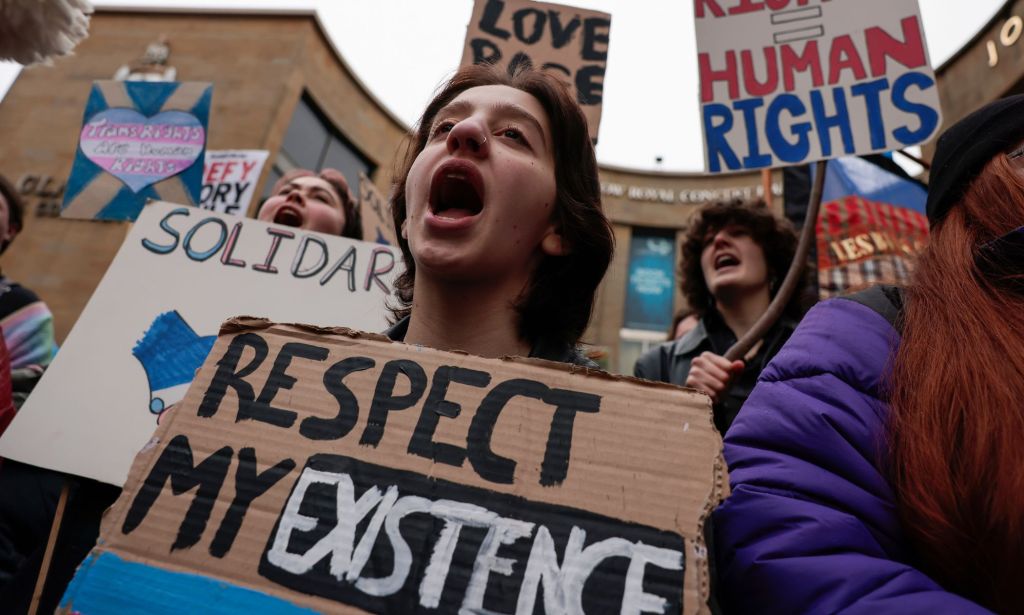EHRC: Equalities boss asked to explain what ‘biological sex’ is. He failed

LGBTQ+ and trans activists met with the EHRC to question the watchdog on its anti-trans bias. The EHRC’s boss floundered to answer basic questions. (Getty)
LGBTQ+ and trans activists met with the EHRC to question the watchdog on its anti-trans bias. The EHRC's boss floundered to answer basic questions. (Getty)
Equalities and Human Rights Commission (EHRC) leaders floundered when asked to define “biological sex”, after the watchdog weighed in on changing the definition of sex in the Equality Act.
On Wednesday (5 April), the EHRC published a letter it wrote to equalities minister Kemi Badenoch, at her request, advising on the impacts of changing the legal definition of “sex” in the Equality Act to mean “biological sex”.
While the letter was merely advisory and did not suggest a path of action, it sent alarm bells ringing throughout the community. The letter laid out areas where a change would bring “greater clarity”, which largely amounted to instances where it would allow for the exclusion of trans women.
The government is understood to be considering its options, but a former EHRC director has suggested that such a change, as well as stripping trans people of their rights, would be “legally illiterate” and unworkable.
In a subsequent meeting between the EHRC and members of the LGBTQ+ community, TransActual chair Helen Belcher asked the watchdog’s CEO, Marcial Boo: “What is biological sex?”
Boo struggled to answer. Instead, after seconds of silence, he deferred to Melanie Field, EHRC executive director of strategy, policy, legal and Wales.
This is according to both tweets from Belcher and a transcription of the conversation posted online by jane fae, also of TransActual.
“Well, I would, the law as it stands doesn’t define biological sex so there is, um, you know, a definitional issue if the government wished to act on the letter,” Field said.
Belcher was again met by silence after she asked the EHRC representatives for the definition they gave when the secretary of state asked the watchdog about biological sex.
Eventually, Field responded: “Um, well, what we’ve done is, is flag there is a definitional issue, so I think the discussions that we’ve had have been on this on the basis that sex recorded at birth is a proxy for biological sex and that’s the that’s the position we’ve set out for existing guidance.”
Belcher pressed the pair, asking if they accept that there are “other aspects of sex which are biological such as hormonal makeup” and psychological makeup which “should also be part of the sex definition”.
Field said that this definition is “clearly an aspect that will need further consideration” if the Tory government seeks changes.
When asked for clarification by PinkNews, a spokesperson for the EHRC said: “The definition of ‘biological sex’ would need to be considered after thorough consultation alongside detailed policy and legal analysis, should the government take this further.”

Belcher asked the EHRC bosses during the meeting what steps they believed the Tory government would take as a result of their letter.
“We don’t know what steps the government will take at all if any,” Boo said.
Belcher then asked if the government was to roll back protections for trans people under the Equality Act, using the EHRC letter as justification, what steps would the EHRC take.
Boo was unable to give a clear response, saying: “We will wait and see what the government proposes to do.”
He admitted he could understand why “trans people might be incredibly angry” with the EHRC, and Belcher followed up by asking if hethought the EHRC could be “trusted as the human rights body” to defend trans people’s rights.
Boo thought it wasn’t the “right time to say this” but hoped the EHRC could “get to a position where we are trusted” and “recognised as an organisation that defends everyone”.
LGBTQ+ and trans rights advocates have increasingly criticised the EHRC for throwing trans people under the bus and meeting with anti-trans groups.
In 2022, a coalition of LGBTQ+ organisations called for it to lose its status as an internationally recognised body over its anti-trans bias. Later that year, the EHRC published guidance on single-sex spaces that essentially includes a how-to guide on excluding trans people.

